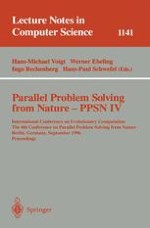1996 | ReviewPaper | Buchkapitel
Are evolutionary algorithms improved by large mutations?
verfasst von : C. Kappler
Erschienen in: Parallel Problem Solving from Nature — PPSN IV
Verlag: Springer Berlin Heidelberg
Enthalten in: Professional Book Archive
Aktivieren Sie unsere intelligente Suche, um passende Fachinhalte oder Patente zu finden.
Wählen Sie Textabschnitte aus um mit Künstlicher Intelligenz passenden Patente zu finden. powered by
Markieren Sie Textabschnitte, um KI-gestützt weitere passende Inhalte zu finden. powered by
When optimizing with evolutionary algorithms in a continuous search space, mutations usually are distributed according to a Gaussian. A Gaussian distribution decays exponentially, i. e. very large mutations are highly unlikely. This bears the risk of the optimization getting caught in local extrema. A more slowly decaying distribution, e. g. a Cauchy distribution, may circumvent this problem. A Cauchy distribution allows for rare large mutations. In this paper the performance of Gaussian and Cauchy distributed mutations, in particular their robustness and rate of progress, are compared analytically and numerically in a number of examples. It turns out that, in one dimension, an algorithm working with Cauchy distributed mutations is both more robust and faster. This result cannot easily be generalized to higher dimensions, where the additional problem of finding the right direction for leaving a saddle point appears. The analysis of a simple two dimensional problem does not yet allow to draw final conclusions concerning which kind of mutations, if any, is preferable in higher dimensions.
